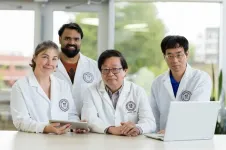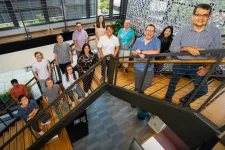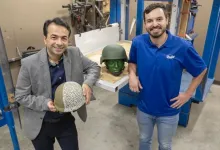(Press-News.org) September 16, 2024—(BRONX, NY)— The National Cancer Institute-designated Montefiore Einstein Comprehensive Cancer Center (MECCC) has announced the new Marilyn and Stanley M. Katz Institute for Immunotherapy for Cancer and Inflammatory Disorders. Xingxing Zang, Ph.D., an international leader in developing novel immunotherapies, has been named its inaugural director.
“Our goal is to be at the forefront of developing novel immunotherapy technologies and advancing them into clinical trials, and ultimately, effective treatments for cancer and other diseases,” said Dr. Zang, professor of microbiology & immunology, of oncology, of medicine, and of urology, the Louis Goldstein Swan Chair in Cancer Research at Albert Einstein College of Medicine, and a senior member of MECCC’s Cancer Therapeutics research program. “Our institute is a collaborative environment that brings together more than 45 leading scientists and clinicians from diverse fields in an interdisciplinary approach for discovering new immunotherapy targets and novel strategies for drug development.”
Harnessing the Power of the Immune System
Immunotherapy, which involves activating and bolstering the immune system to eliminate disease, has revolutionized cancer treatment over the past 20 years. There are several types of cancer immunotherapies: adoptive cell therapy, which takes a patient’s immune cells, multiplies or alters them in the lab, and infuses them back into the patient; cancer vaccines, which “train” the immune system to fight an existing malignancy; immune cell engagers, which redirect the patient’s immune cells toward cancer cells; antibody-drug conjugates, in which antibodies that target cancer cells are linked with chemotherapy molecules that kill the cells; and immune checkpoint inhibitors that release the “brakes” on the immune system. In 2018, James Allison, Ph.D., Dr. Zang’s mentor, received the Nobel Prize for developing the first checkpoint inhibitor. Currently nine checkpoint inhibitors are approved for treatment of different cancers and have revolutionized the treatment of malignant disorders.
Over the course of his career, Dr. Zang has discovered several new immune checkpoints and developed numerous checkpoint inhibitors, focused mainly on inhibiting the B7-CD28 families, proteins that play important roles in cancer immune evasion and progression. Two of his checkpoint inhibitors are now being evaluated in phase 1 and phase 2 clinical trials in 12 different types of solid cancers and three different types of blood cancers. He has also formed his own company to further develop novel inhibitors against metastatic cancers that don’t respond to current drugs. Earlier this year, he led a team at MECCC that showed that CAR-T, a type of adoptive cell therapy now used against blood cancers, can successfully treat solid tumors.
“Dr. Zang’s expertise, knowledge, creativity, productivity, and collaborative spirit have made him a true leader in the field,” said Edward Chu, M.D., M.M.S., director of MECCC. “We are extraordinarily pleased that he will lead this important new endeavor.”
Critical Sustaining Support
Philanthropic support has been critical to establishing the new institute. “This would not have been possible without the generosity of Marilyn and Stanley Katz,” said Yaron Tomer, M.D., the Stanley M. Katz Dean at Einstein and chief academic officer at Montefiore Einstein. “Their $4.5 million endowment gift will provide a perpetual engine of support to the institute, giving us the opportunity and flexibility to invest in the promising science that can lead to novel discoveries and treatments.”
Gregoire Lauvau, Ph.D., professor of microbiology & immunology and the Sylvia and Robert S. Olnick Faculty Scholar in Cancer Research at Einstein and a member of MECCC’s Cancer Therapeutics research program, serves as the institute’s associate director for basic research. Chandan Guha, M.B.B.S., Ph.D., vice chair of radiation oncology at Einstein and Montefiore, professor of radiation oncology, of urology, and of pathology at Einstein, and associate director of innovation/tech transfer at MECCC, is associate director for clinical/translational research.
***
About Montefiore Einstein Cancer Center
Montefiore Einstein Cancer Center (MECC) is a national leader in cancer research and care located in the ethnically diverse and economically disadvantaged borough of the Bronx, N.Y. MECC combines the exceptional science of Albert Einstein College of Medicine with the multidisciplinary and team-based approach to cancer care of Montefiore Health System. Founded in 1971 and a National Cancer Institute (NCI)-designated Cancer Center since 1972, MECC is redefining excellence in cancer research, clinical care, education and training, and community outreach and engagement. Its mission is to reduce the burden of cancer for all, especially people from historically marginalized communities.
END
New research has answered the mystery of how the Crystal Palace in London, which at the time was the world’s largest building, was constructed in only 190 days.
The study, led by Professor John Gardner of Anglia Ruskin University (ARU) in Cambridge, England, has discovered that the Crystal Palace was the first building known to have made use of a standard screw thread – something that’s now taken for granted in modern construction and engineering.
Completed just in time for the start ...
The importance of disorder in physics is only matched by the difficulty to study it. For example, the remarkable properties of high-temperature superconductors are greatly affected by variations in the chemical composition of the solid. Techniques that enable measurements of such disorder and its impact on the electronic properties, such as scanning tunnelling microscopy, work only at very low temperatures, and are blind to these physics near the transition temperature. Now, a team of researchers of the Max Planck Institute for the Structure and Dynamics of Matter (MPSD) in Germany and Brookhaven National ...
FRANKFURT. In January 2024, 16 Frankfurt-based research institutions joined forces to set up the “Frankfurt Alliance”, made up of Goethe University Frankfurt and several non-university research institutions. With the aim of visualizing at an event held in the heart of the Main metropolis both the strength and the diversity of research conducted in the science city of Frankfurt and the larger Rhine-Main region, including its importance for society, the alliance invites you to the first “Science Festival”, held
on Saturday, September 28, from 10 a.m. to 7 p.m.
at Roßmarkt
in ...
The Alliance for Clinical Trials in Oncology today announced final results will be presented at ESMO 2024 from CABINET (A021602), a phase III trial evaluating cabozantinib compared with placebo in two cohorts of patients with previously treated neuroendocrine tumors: one cohort of patients with advanced pancreatic neuroendocrine tumors (pNET) and a second cohort of patients with advanced extra-pancreatic NET (epNET). The study met the primary objective for each cohort, demonstrating that cabozantinib provided dramatic improvements in median ...
To build upon a quarter-century of world-renowned research in zoonotic viral diseases, X.J. Meng has been rewarded with a prestigious National Institutes of Health (NIH) Method to Extend Research in Time (MERIT) Award – the first awarded to Virginia Tech.
“This is a huge honor and privilege,” said Meng, University Distinguished Professor of Molecular Virology in the Virginia-Maryland College of Veterinary Medicine and a member of the National Academy of Sciences. “It is really gratifying to know ...
By Benjamin Boettner
(BOSTON) — Researchers at the Wyss Institute for Biologically Inspired Engineering at Harvard Universityreceived a contract for up to $12M from the Defense Advanced Research Projects Agency (DARPA)’s new SHIELD program. The SHIELD (Synthetic Hemo-technologies to Locate and Disinfect) program aims to develop a prophylactic treatment that can be broadly administered to trauma victims in combat casualty care scenarios to rapidly clear multiple bloodborne bacterial and fungal pathogens, limit morbidity and mortality, and protect recipients for up to seven days.
Blood ...
The deadly H5N1 avian influenza virus, which has killed millions of birds worldwide since 2021 – and in rare cases can be transmitted to humans – may be spread through the food-stealing behaviour of some seabirds.
A study published today in the journal Conservation Letters highlights food theft – also known as ‘kleptoparasitism’, where some seabird species like frigatebirds and skuas force other birds to regurgitate their prey – as a possible transmission path for the spread of avian flu.
Led by scientists from UNSW Sydney’s ...
SAN ANTONIO — September 16, 2024 —Researchers from Southwest Research Institute (SwRI) and The University of Texas at San Antonio (UTSA) are creating innovative military helmet pads designed to prevent traumatic brain injury (TBI). The project, led by SwRI’s Dr. Daniel Portillo and UTSA’s Dr. Morteza Seidi, is supported by a $125,000 grant from the Connecting through Research Partnerships (Connect) program.
Traumatic brain injury can affect human performance and quality of life. It is ...
Indianapolis – Patients with low-risk cancers undergoing active surveillance face a favorable long-term prognosis. David Haggstrom, M.D., MAS, makes the case that it’s time for the medical field to help manage the anxiety caused by waiting.
Dr. Haggstrom, a physician-researcher with Regenstrief Institute, the Veterans Administration Medical Center in Indianapolis and the Indiana University School of Medicine, is lead author of a Viewpoint article, published in JAMA (Journal of the American Medical ...
The Kinsey Institute at Indiana University, in partnership with leading sexual wellbeing company the Lovehoney Group and its Womanizer brand, has released early data from new nationally representative surveys exploring menopause knowledge, symptom management, medical care engagement, and health disparities among Americans.
Phase 1 surveyed of 1,500 American adults aged 18-88, to assess overall public knowledge and understanding of menopause. Phase 2 surveyed 1,500 women aged 40-65, to better understand women’s experiences with menopause. ...






